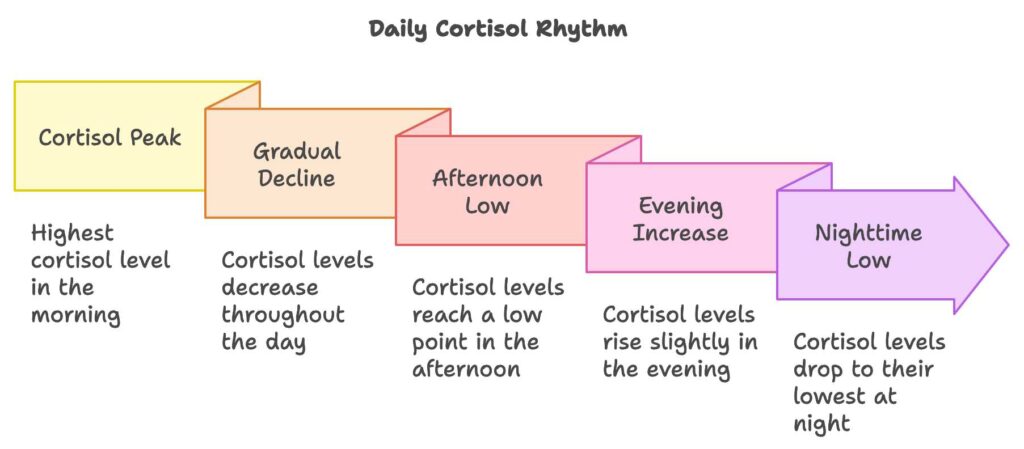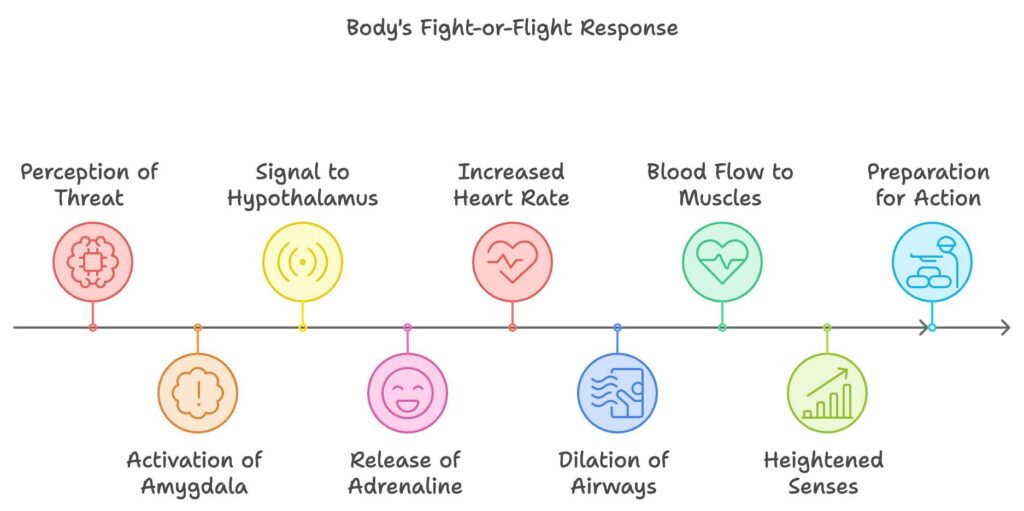Ever feel like your body’s running on high-alert mode 24/7? Meet cortisol – your body’s built-in alarm system that’s either your best friend or your worst enemy, depending on how you manage it.
This tiny but mighty hormone isn’t just about stress; it’s the backstage manager of everything from your energy levels to your immune system. But here’s the thing: while a little cortisol keeps you sharp and ready for action, too much can turn your body into a stress factory. Whether you’re battling burnout, dealing with anxiety, or just trying to understand why you feel wired but tired, understanding cortisol could be the key to reclaiming your calm.
Understanding Cortisol and Stress
Cortisol’s pretty much your body’s way of handling stress. Getting to know this hormone is key to keeping your mind in check.
What is Cortisol?
Ever heard of the stress hormone? That’s cortisol, made by your adrenal glands every time life throws you a curveball.
It kicks in to boost your energy, keep blood sugar in line, and make sure your blood pressure doesn’t throw a fit. Normally, it’s a good guy, but when it hangs around too long, it starts causing trouble.
“Cortisol is not the enemy; it’s the key to understanding how our body responds to stress.” – Dr. Hans Selye
| Function | Description |
|---|---|
| Energy Boost | Ups glucose for that quick burst of energy. |
| Blood Pressure Buddy | Keeps your BP steady when stress hits hard. |
| Immune System Juggler | Juggles immune response during stressful times. |
The Impact of Stress on Cortisol Levels
Stress cranks up the cortisol factory. Whether you’re dealing with a fever or fighting off crazy deadlines, cortisol steps up. It’s part of that ‘fight or flight’ thing, making your heart race and putting you on high alert. But when stress overstays its welcome, it leaves you in a bit of pickle with cortisol dialed up for too long and messing with body and mind.
| Stress Type | Cortisol’s Knee-jerk Reaction |
|---|---|
| Short-Term Stress | Quick spike in cortisol. |
| Long-Term Stress | Cortisol hangs around longer than you’d like. |
Having cortisol stick around too long is like inviting anxiety, depression, and bodily headaches to your life party. Maybe you’ve noticed your stomach acting up or your head pounding? Swing by our article on physical symptoms of stress for more on that. Nail down what’s happening and you’ll be on your way to a solid stress management plan and keeping yourself chill and healthy.

Effects of High Cortisol Levels
Having too much cortisol floating around in your system isn’t just a minor inconvenience – it’s like letting a hyperactive child loose in a china shop. Things can get messy, both in your body and mind. Getting a handle on this stress hormone is key to keeping life running smoothly.
Physical Health Effects
When cortisol levels are up, the body throws a bit of a tantrum. Here’s what you might notice:
| Physical Effects | Description |
|---|---|
| Weight Gain | Makes you snack more than a squirrel before winter, especially in the belly area. |
| High Blood Pressure | Stress pumps up the pressure, which can stress the heart, too. |
| Weakened Immune Response | A stressed immune system is like leaving the fort gates open – illnesses march right in. |
| Digestive Problems | Your stomach might turn into a drama queen with indigestion, constipation, or diarrhea. |
| Skin Changes | Expect unwanted visitors like acne or eczema from time to time. |
If these sound familiar, it might be time to consider a stress management plan.
Mental Health Effects
Your brain’s no fan of high cortisol either. When it sticks around too long, you might deal with:
| Mental Effects | Description |
|---|---|
| Anxiety | Makes you feel like you drank five too many espressos – jittery and uneasy. |
| Depression | Who knew nostalgia could bring a friend named ‘the blues’? |
| Cognitive Impairment | Memory foggier than a morning mist, concentration out the window. |
| Sleep Disturbances | Nights can turn into a restless saga of tossing and turning. |
Lowering cortisol can help get your mental ease back on track with some quick stress relief techniques or breathing exercises.
Recognizing these symptoms is half the battle. Once you’ve spotted them, there’s a wealth of info out there on chronic stress symptoms to guide you back to better days.
Managing Cortisol Levels Through Lifestyle Changes
Keeping cortisol levels in check can really boost your mental health. Simple lifestyle tweaks, like working up a sweat, eating right, catching enough Zs, and dealing with stress better, can help tame this stress hormone into submission for smoother days ahead.
“The goal isn’t to eliminate stress, but to manage it. Quality sleep, proper nutrition, and regular exercise are your best allies.” – Dr. Robert Sapolsky
Regular Exercise
Moving your body is a game-changer for keeping cortisol levels steady. When you’re working out, not only do you kick stress and anxiety to the curb, but your brain also releases endorphins – those feel-good vibes.
| Type of Exercise | Recommended Duration | Frequency |
|---|---|---|
| Aerobic Activities (running, cycling) | 30 minutes | 5 days a week |
| Strength Training | 30 minutes | 2-3 days a week |
| Mind-Body Exercises (yoga) | 30 minutes | 2-3 days a week |
Want some exercise ideas that really zap stress? Check out our article on best exercises for stress.
Healthy Diet
What you eat can totally affect cortisol levels. Eating a balanced diet full of whole foods packs your body with the right nutrients to fight stress. Some foods do more good than others.
| Food Type | Benefits |
|---|---|
| Fruits and Vegetables | Loaded with vitamins and antioxidants to fight inflammation |
| Whole Grains | Keep your blood sugar steady, helping keep the mood swings at bay |
| Omega-3 Fatty Acids | Found in fish and flaxseed; they help calm down stress and anxiety |
Munching on these can also boost your overall health. For the scoop on which foods are stress-busters, check our article on foods that reduce stress.
Sufficient Sleep
Good sleep is a big deal for managing cortisol. If your sleep is off, expect stress and cortisol to climb. Setting a bedtime routine can make a real difference in how you feel during the day.
| Sleep Duration | Recommended Hours |
|---|---|
| Adults | 7 to 9 hours |
| Teens | 8 to 10 hours |
For sleep tips that’ll have you snoozing like a baby, peek at our article on stress management plan.
Stress Management Techniques
Finding ways to chill out can seriously help with cortisol. There are plenty of simple tricks you can weave into your daily doings to keep stress in check.
| Technique | What to Do |
|---|---|
| Deep Breathing Exercises | Fast track to tension relief and relaxation. Dive into our article on breathing exercises stress. |
| Mindfulness Meditation | Grounds your thoughts, cutting down anxiety levels. |
| Time Management | Nail your to-do list and banish overwhelm with more tips in time management stress relief. |
Working these lifestyle tweaks into your routine can make waves in keeping cortisol steady and boosting mental health. Getting the hang of managing cortisol through straightforward habits can lead to a healthier and more chill life.

Professional Help and Support
When you’re wrestling with cortisol—the stress hormone that’s making your life feel like a pressure cooker—getting some backup can be a real game-changer. Therapy options and support groups are worth checking out because they’re like the trusty sidekick you need when stress gets the best of you.
Therapy Options
Think of therapy as the comfy corner where you get to spill your thoughts, feelings, and any stress-induced quirks. It’s all about figuring out the mental puzzle and how cortisol is playing its tricky games. Different strokes for different folks, so let’s see what therapy couches are out there.
| Type of Therapy | What It Does |
|---|---|
| Cognitive Behavioral Therapy (CBT) | It’s like a brain rewire—finding those sneaky negative thoughts and swapping them for something less stress-inducing. |
| Mindfulness-Based Stress Reduction (MBSR) | Pulls Zen into your life, getting you to pause and chill so stress doesn’t take the driver’s seat. |
| Psychodynamic Therapy | Puts on the detective hat to dig into past events that still rattle your nerves. |
| Dialectical Behavior Therapy (DBT) | Think emotional toolbox—crafting skills to manage your roller-coaster feelings and stress. |
Want the scoop on how to keep stress in check? Peek into our stress management plan. Therapy’s your ally in decoding the cortisol puzzle and guarding your mental well-being.
Support Groups
Ever feel like you’re alone in your stress battle? Support groups are here to remind you that you’re not. They’re like a warm hug and a high-five from people who totally get what you’re going through.
| Type of Support Group | What They Focus On |
|---|---|
| General Stress Support Group | A place to just let it out when everything feels overwhelming. |
| Specific Condition Support Group | Zeroes in on particular woes like anxiety, money problems, or those stressors at work. |
| Online Support Groups | Perfect for stress-ninjas who want to connect but can’t make a meet-up. |
Plugging into these groups can be refreshing; it’s where you find your tribe, build friendships, and set up a support squad for life. Curious about knocking out stress fast? Dive into our quick stress relief techniques.
Professional support is like arming yourself with the right toolkit for tackling cortisol head-on, setting you up for winning the mental health game.
Mind-Body Practices for Cortisol Regulation
Taking care of cortisol—the body’s stress hormone—can boost your mental well-being like a comfy pair of slippers. It’s about peace and chill. We’re diving into three life hacks: meditation, yoga, and some good old breathing exercises. Let’s see how these can bring a little Zen into your life.
Meditation
Meditation is your best buddy when it comes to chilling out and getting your head straight. It pulls you into the now, easing those anxious thoughts. With regular practice, it’s a surefire way to smack down cortisol levels and get some emotional housekeeping done.
You might wonder what all the buzz about meditation is for. Here’s how it helps kick stress to the curb:
| What It Does | How It Helps |
|---|---|
| Less Stress | Keeps your stress radar in check. |
| Laser Focus | More focus = less brain fog. |
| Mood Balance | Makes you a ninja at handling emotions. |
If you’re looking for a simple start, check out our article on quick stress relief techniques.
Yoga
Yoga is like a smoothie for the soul, mixing moves, breathing, and mindfulness into one. It’s a great go-to for putting stress on mute and rebooting your mental system.
Here’s why yoga rocks for ditching that stress hormone:
| What It Does | How It Helps |
|---|---|
| Stress Busting | Steps up to counteract the stress vibes. |
| Flexibility | Makes your body happier, which calms your mind. |
| Mind Over Matter | Teaches you to be present with your thoughts. |
Looking to add yoga to your mix? Check out our article on best exercises for stress.
Breathing Exercises
Breathing exercises are the secret weapon for stress. They’re easy, don’t need a yoga mat, and they work wonders on cortisol. They’re all about those slow, purposeful breaths that chill your body out.
Here’s how breathing exercises get you that instant zen:
| What It Does | How It Helps |
|---|---|
| Quick Calm | A fast track to peace in tense moments. |
| Heart Rate Harmony | Helps slow beats down when stress spikes. |
| Better Mood | Boosts your overall well-being vibes. |
Want to give it a shot? Explore our article on breathing exercises stress.
Bringing meditation, yoga, and breathing exercises into your daily grind can work wonders on cortisol levels, dialing down stress and making room for relaxation and self-awareness. So, take that step, embrace these practices, and see how transforming your chill game can transform your life.
Importance of Social Connections
Having people around who lift you up can do wonders for your peace of mind. These bonds not just help you tackle that awful stress hormone, cortisol, but they also keep your spirits high. Feeling connected to others ditches loneliness and helps keep stress at bay.
Building Supportive Relationships
Surround yourself with folks who really get you. Family, friends, or even that neighbor who’s always up for a chat, can help keep your mental game strong. By swapping stories and sharing what’s on your mind, you’re not just letting some steam off—you’re arming yourself against stress. Here’s the trick to building those strong ties:
- Say It Loud: Be open about what you’re thinking and feeling. It makes for better conversations and tighter relationships.
- Hang Out: Making memories with loved ones? That’s the good stuff that keeps stress low.
- Do Stuff Together: Whether it’s a jog around the block or picking up a new hobby, shared activities put smiles on faces and keep stress at bay.
| What Helps | How It Helps |
|---|---|
| Say It Loud | Builds better understanding |
| Hang Out | Makes relationships stronger |
| Do Stuff Together | Lightens mood and stress |
Want more on how to up your social game? Check out quick stress relief techniques.
Seeking Help When Needed
Sometimes, even your closest pals might not cut it. That’s when the pros step in. Mental health professionals are there to offer the tools and support you need. Here’s how to find help:
- Therapy: A good chat with a counselor can give you the tools to handle life’s ups and downs.
- Support Groups: Talking it out with others who are in the same boat can be a huge relief.
- Community Resources: Whether through local groups or a hotline, help is just a call away.
Knowing when to call in reinforcements is a big part of keeping stress in check. If you’re hit by chronic stress symptoms or life feels too heavy, don’t be shy about reaching out.
Keeping a cool circle of friends and being on top of your mental health game helps tackle stress and boosts your overall vibe.
Self-Care Practices
We all need to give ourselves a break sometimes, and that’s where self-care steps in. It helps keep that pesky cortisol, aka the stress hormone, in check and keeps you feeling more like yourself. Think of it as your emotional spa day. There are two biggies in the self-care world: making it a priority and figuring out where to draw the line with others.
Prioritizing Self-Care
If you’re feeling stressed or your cortisol’s through the roof, putting yourself first can be like flipping a switch. We’re talking workouts, chilling out, or even just doing something fun. Here’s a quick look at different self-care stuff and why it’s awesome:
| Self-Care Practice | Benefits |
|---|---|
| Regular Exercise | Keeps stress at bay and lifts your spirits |
| Eating Right | Fuels your body and keeps you healthy |
| Relaxation Techniques | Tames cortisol and brings calm |
| Mindfulness or Meditation | Sharpens focus and eases nerves |
| Creative Outlets | Lets you express yourself and have fun |
Try these out. Mix it up and see what works best for you. Make a habit out of it, and you’ll be giving stress the boot while feeling better all-around. Need some quick fixes? Check out these stress-relief hacks and food remedies.

Setting Boundaries
Now, let’s talk boundaries. They’re your superhero shield against being overwhelmed and keeping stress in check. They help sort out what’s important for you versus other people’s demands. But lots of people shy away from setting them because they don’t want to ruffle feathers or seem harsh.
Here’s how to master the boundary game:
- Spot Your Limits: Know what drains your time, energy, and emotions.
- Sound Like A Boss: Talk straight about your limits without waffling.
- Just Say No: Get comfy with turning down stuff that messes with your plans or duties.
- Stick To Your Guns: Keep those lines firm, so everyone gets you’re serious.
Laying down the law with boundaries can really help keep stress in check and protect your peace of mind. Dive into more on boundary-setting if you want the long version.
Handling that pesky cortisol involves take-charge self-care and putting boundaries front and center. These moves can lead to a more chill life and better headspace, no matter how hectic things get.
Monitoring Progress and Seeking Help
Keeping an eye on cortisol levels might not be top-of-mind until stress starts knocking loudly on your door. By catching the signs early, you can better manage your mental health, so let’s break it down in a less uptight way.
Tracking Stress Levels
Let’s talk about our good buddy, the stress journal. This isn’t just scribbling about the bad stuff. By noting daily vibes, moments that caused you to tense up, and any annoying bodily functions, you’re setting yourself up to stop stress before it starts messing with you.
| Day | Stress Level (1-10) | Trigger | Physical Symptoms |
|---|---|---|---|
| 1 | 7 | That tight work deadline | Head’s throbbing, you’re feeling like a zombie |
| 2 | 4 | Squabbling with family | Stomach queasy like you’re on a rollercoaster |
| 3 | 9 | Dollar signs disappearing | Sleep? What’s sleep? |
| 4 | 5 | Exam countdown | Muscles have turned into stone |
By logging these tidbits, you’ll spot a grumpy pattern quicker than you can say “Not today, stress!” This gives you the upper hand when crafting a stress management plan that’s all about peace and calm.

Knowing When to Seek Professional Help
Sometimes stress gets so big it needs professional help. Spotting when it’s time to dial in backup can be fuzzy, but these signs won’t steer you wrong:
| Symptoms | When to Seek Help |
|---|---|
| Panic, all day, every day | Anxiety’s moved in and won’t be evicted, interrupting your life |
| Can’t shake the blues | Down in the dumps isn’t leaving after weeks of guesting |
| Stress left you feeling like a physical wreck | Headaches and a tummy that thinks you’re always on a tilt-a-whirl, not budging even with trying to fix it yourself (physical symptoms of stress) |
| Everything’s going downhill | Work meetings, school stuff, even hangouts with friends are turning into Herculean tasks because stress gatecrashed |
When these signs pop up like uninvited guests, it might be time to chat with a pro. They’re loaded with tools and tricks, including quick stress relief techniques, and can guide you on therapies that tackle cortisol like a boss.
More people talking about stress means less stress about stress. So keep the conversation open and gather your squad when things look grim. Stepping up for your mental health isn’t just brave, it’s your ticket to feeling more like yourself.
Conclusion
Understanding and managing cortisol isn’t just about reducing stress – it’s about revolutionizing your entire well-being. From lifestyle changes and mind-body practices to building strong social connections and prioritizing self-care, you now have a comprehensive toolkit for keeping this powerful hormone in check. Remember, the goal isn’t to eliminate cortisol (you need some of it!), but to create a balanced relationship with your body’s stress response. By implementing these strategies and staying mindful of your body’s signals, you’re not just managing stress – you’re investing in a more balanced, energized, and resilient version of yourself.
FAQs
What exactly is cortisol and why is it important?
Cortisol is a stress hormone produced by adrenal glands that regulates various bodily functions including metabolism, immune response, and blood pressure. It’s essential for survival but needs to be balanced.
How can I tell if my cortisol levels are too high?
Common signs include weight gain (especially around the midsection), trouble sleeping, anxiety, mood swings, difficulty concentrating, and persistent fatigue. Consult a healthcare provider for proper diagnosis.
What are natural ways to lower cortisol levels?
Regular exercise, adequate sleep, meditation, a healthy diet, and stress management techniques can help. Focus on activities that promote relaxation and reduce stress.
Can diet affect cortisol levels?
Yes, certain foods can impact cortisol levels. Avoid excessive caffeine and sugar, and focus on whole foods, complex carbohydrates, and foods rich in vitamin C, magnesium, and omega-3 fatty acids.
How long does it take to normalize cortisol levels?
It varies by individual, but with consistent lifestyle changes, people typically notice improvements within 4-6 weeks. Severe imbalances may require medical intervention.
Resources
- Mayo Clinic: “Chronic Stress”
https://www.mayoclinic.org/healthy-lifestyle/stress-management/in-depth/stress/art-20046037 - Cleveland Clinic: “Cortisol”
https://my.clevelandclinic.org/health/articles/22187-cortisol - Harvard Health: “Understanding the Stress Response”
https://www.health.harvard.edu/staying-healthy/understanding-the-stress-response






